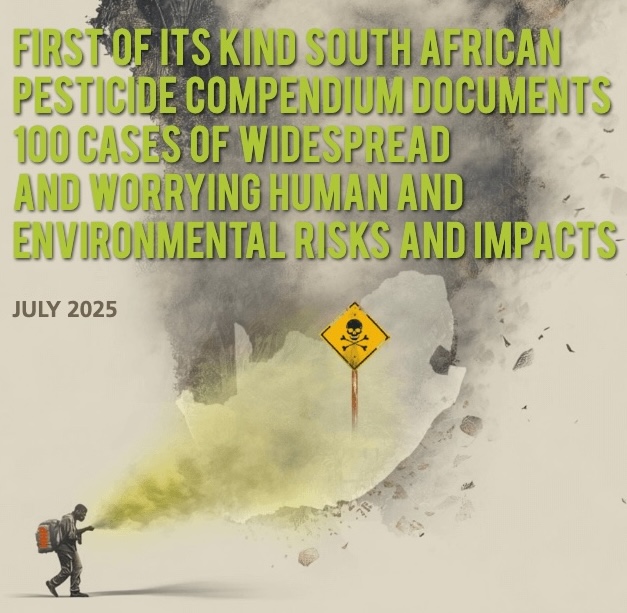Within the South African context of regulatory failure, antiquated legislation, and co-optation by industry, a considerable number of agrotoxins classified as highly hazardous pesticides (HHPs) – many of which are banned in regions such as the European Union (EU) – as well as other noxious chemicals, have become ubiquitous in our environment, our food and our bodies.
This is despite the ever-increasing body of evidence of the unequivocal human and environmental harm caused by these deadly chemicals. Thus, to bolster our collective efforts to push for regulatory reform and the banning of the worst of the offenders, and the phase-out of others, ACB embarked on a mammoth task over several months of collating the studies that have taken place over the past 20 years into a searchable Compendium, which currently contains over 100 studies.
The database spans scientific research evidencing the unequivocal human and environmental harm caused by agrotoxins, and advocacy research and briefing papers addressing the institutional and regulatory failures. In the accompanying briefing, we expand on the findings. ACB hopes this resource will prove invaluable to researchers wanting to quickly find all available studies relating to specific chemicals or specific effects and will lead to deeper meta-analyses.
While the Compendium may not be exhaustive, it does offer a representative illustration of the volume and quality of evidence generated, including numerous studies that provide clear and often urgent recommendations to policymakers to address identified risks and provide redress. So why has this work not been taken up by the regulatory authorities?

You can read the briefing here.
Please click here to access the Compendium.
While the Compendium may not be exhaustive, it does offer a representative illustration of the volume and quality of evidence generated, including numerous studies that provide clear and often urgent recommendations to policymakers to address identified risks and provide redress. So why has this work not been taken up by the regulatory authorities?
Part of the problem has been that the only official platform to take scientific evidence to relevant organs of the state is the Multi-Stakeholder Committee on Chemicals Management (MCCM), which is voluntary, and thus, the findings shared through this channel have had negligible results. Furthermore, the Department of Agriculture, Land Reform and Rural Development (DALRRD) – the government department responsible for oversight of pesticide usage – barely engages or attends sessions. Through other channels, there have been strong efforts at times by scientists and civil society, both formally and informally, to bring relevant peer-reviewed scientific studies to the attention of government, but with little to show for it. This highlights the disconnect between science and policy and the deeply concerning lack of government accountability and unwillingness to engage. Further complications arise due to insufficiencies in some of the research, while in other instances, it has either not been communicated to the government, or it is difficult to trace results.
Not only is our legal framework hopelessly outdated, but the government also continues to disregard international commitments that call for a reduction in synthetic fertiliser and toxic pesticide use. A key finding from this research is that domestic political decisions informed by scientific evidence of harm are making a negligible impact on phasing out HHPs, despite commitments made by the government over the past decade. Currently, around 194 HHPs are still legally imported and used in the country, with 116 of these banned in the EU. These toxins present particularly high levels of acute or chronic hazards to health or the environment, according to internationally accepted hazard classification systems.
This number was 195, but after extensive and recently mounting pressure from scientists and civil society, the government announced that Terbufos will be banned. This followed the South African People’s Tribunal on AgroToxins (SAPToA), which was held in April, after which the three jurors, Judge Navi Pillay, Commissioner Philile Ntuli, and Dr Sophia Kisting-Cairncross, then made a presentation on HHPs and other agrotoxins to the Portfolio Committee on Agriculture on May 20.1 This led to the Cabinet’s decision on 12 June 2025 to ban Terbufos.2 This victory highlights the importance of this advocacy work and the need to maintain the pressure on the government.
ACB’s papers included in the Compendium also put a spotlight on the expanding use of hazardous agrotoxins, such as glyphosate, 2,4-D, and glufosinate ammonium, in conjunction with genetically modified (GM) crops, particularly in the case of stacked GM traits that involve agrotoxins in combination. ACB has commented previously on how disingenuous it is of our legislators to have separated genetically modified organisms (GMOs) from the associated chemicals and their combined potential impact on biodiversity and human and animal health. This is reflected in anomalies in the amended GMO Act, which has oversight over the GM seed varieties but no provisions to review the impacts of the associated chemicals on biodiversity and the environment.
We hope that this Compendium will assist our ongoing collective efforts to compel the government to reclaim its role as regulator and meet its constitutional duty to respond to this massive and growing body of evidence and thereby put in place measures to protect all South Africans and our environment from harm.
Furthermore, SA urgently needs to develop a comprehensive Pesticide Action Plan, which should:
- Be aligned with international best practices.
- Repeal the Fertiliser, Farm Feeds, Agricultural Remedies and Stock Remedies Act 36 of 1947 and replace it with legislation that conforms to our Bill of Rights, Constitution, other post-1994 legislation, and international obligations.
- Phase out or ban the most hazardous pesticides.
- Outline a clear roadmap for supporting farmers to transition out of industrial chemical-based food, fibre, and crop production systems to systems that are grounded in agroecological principles, social justice, equity, and job creation.
You can read the briefing here.
Please click here to access the Compendium.
[1] https://www.youtube.com/live/grYfdF2r-nw?si=We8aDSdNT2VPMr8B
[2] https://acbio.org.za/corporate-expansion/cabinet-ends-corporate-impunity-bans-toxic-pesticide-terbufos/



